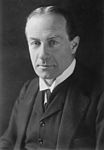United Kingdom general election, 1923
|
|||||||||||||||||||||||||||||||||||||||||||||
|
|
|||||||||||||||||||||||||||||||||||||||||||||
|
All 615 seats Constituency results 308 seats needed for a majority |
|||||||||||||||||||||||||||||||||||||||||||||
|---|---|---|---|---|---|---|---|---|---|---|---|---|---|---|---|---|---|---|---|---|---|---|---|---|---|---|---|---|---|---|---|---|---|---|---|---|---|---|---|---|---|---|---|---|---|
| Turnout | 71.1% |
||||||||||||||||||||||||||||||||||||||||||||
|
|||||||||||||||||||||||||||||||||||||||||||||
|
|||||||||||||||||||||||||||||||||||||||||||||
| 1922 election • MPs |
| 1923 election • MPs |
| 1924 election • MPs |
| 1929 election • MPs |
The United Kingdom general election of 1923 was held on Thursday 6 December 1923. The Conservatives, led by Stanley Baldwin, won the most seats, but Labour, led by Ramsay MacDonald, and H. H. Asquith's reunited Liberal Party gained enough to produce a hung parliament. It was the last UK general election in which a third party (the Liberals) won more than 100 seats, or received more than 26% of the vote.
As the election had been fought on the Conservative proposals for tariff reform, it was inevitable that they could not retain office. As a result, MacDonald formed the first ever Labour government with tacit support from the Liberals. Asquith's motivation for permitting Labour to enter power, rather than trying to bring the Liberals back into government, was that he hoped they would prove to be incompetent and quickly lose support. Being in a minority, MacDonald's government only lasted 10 months and another election was held in October 1924.
Contents
Overview
During 1923 the Ruhr crisis led to a growing feeling of German sympathy in Britain, with people increasingly fed up of international crises in Europe. By May 1923 the then-Prime Minister Bonar Law fell ill and resigned on 22 May,[1] after just 209 days in office. He was replaced by Baldwin. Having only had an election just the year before, Baldwin's party had a comfortable majority in the Commons and could have waited another four years, but the government was concerned with unemployment and protectionism. He felt the need to receive a mandate from the people, which, if successful, would strengthen his grip on the Conservative party leadership.[2]
The result however backfired on Baldwin, who lost a host of seats to Labour and the Liberals. For the first time in history, Labour would be in government.
Results
| 258 | 191 | 158 | 8 |
| Conservative | Labour | Liberal | O |
| UK General Election 1923 | |||||||||||
|---|---|---|---|---|---|---|---|---|---|---|---|
| Candidates | Votes | ||||||||||
| Party | Leader | Standing | Elected | Gained | Unseated | Net | % of total | % | No. | Net % | |
| Conservative | Stanley Baldwin | 536 | 258 | − 86 | 41.951 | 38.0 | 5,286,159 | −0.5 | |||
| Labour | Ramsay MacDonald | 427 | 191 | + 49 | 31.056 | 30.7 | 4,267,831 | +1.0 | |||
| Liberal | H. H. Asquith | 457 | 158 | + 96 | 25.691 | 29.7 | 4,129,922 | +10.8 | |||
| Nationalist | Joseph Devlin | 4 | 3 | 0 | 0 | 0 | 0.487 | 0.4 | 54,157 | N/A | |
| Independent | N/A | 6 | 2 | 0 | 1 | − 1 | 0.325 | 0.3 | 36,802 | −0.5 | |
| Communist | Albert Inkpin | 4 | 0 | 0 | 1 | − 1 | 0.2 | 34,258 | 0.0 | ||
| Belfast Labour | David Robb Campbell | 1 | 0 | 0 | 0 | 0 | 0.2 | 22,255 | N/A | ||
| Independent Labour | N/A | 4 | 0 | 0 | 1 | − 1 | 0.2 | 17,331 | 0.0 | ||
| Independent Liberal | N/A | 3 | 1 | 1 | 1 | 0 | 0.1 | 16,184 | 0.0 | ||
| Constitutionalist | N/A | 1 | 0 | 0 | 1 | − 1 | 0.1 | 15,500 | 0.0 | ||
| Independent Conservative | N/A | 1 | 0 | 0 | 3 | − 3 | 0.1 | 15,171 | −0.8 | ||
| Scottish Prohibition | Edwin Scrymgeour | 1 | 1 | 0 | 0 | 0 | 0.1 | 12,877 | 0.0 | ||
| Christian Pacifist | N/A | 1 | 1 | 0 | 0 | 0 | 0.0 | 570 | N/A | ||
Total number of votes cast: 13,909,017. Turnout 71.1%[3] All parties shown. Conservatives include Ulster Unionists.
Votes summary
Seats summary
Constituency results
For a full list of the results by constituency, see Constituency election results in the United Kingdom general election, 1923.
See also
References
- ↑ http://www.number10.gov.uk/history-and-tour/prime-ministers-in-history/andrew-bonar-law
- ↑ Paul W. Doerr, British foreign policy 1919-1939 p.75-76
- ↑ http://www.parliament.uk/documents/commons/lib/research/rp2008/rp08-012.pdf
- F. W. S. Craig, British Electoral Facts: 1832-1987
- United Kingdom election results - summary results 1885-1979


